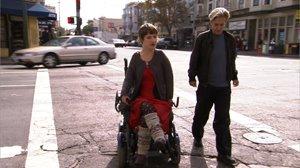Examined Life

Astra Taylor’s documentary, Examined Life, is fantastically untimely in both its form and content. Formally, the documentary is structured as a series of eight, roughly ten-minute segments in which nine of today’s leading critical thinkers ruminate upon a social and ethical issue. Each thinker (seven have their own segment while Judith Butler and Sunaura Taylor share a segment on a discussion gender and disability) is filmed while in movement: Peter Singer, for example, discusses consumer ethics while walking along Fifth Avenue in New York City; Slavoj Žižek rummages though heaps of trash at a landfill while wildly gesticulating about his philosophy of a new ecology for the twenty-first century.
The carefully regimented segments divided by topic and thinker (Avital Ronell bitterly jokes that she should have more face time than the others) are made cohesive by the theme of movement (of going for a walk or even rowing a boat in the middle of Central Park). Taylor’s utilization of the canonic concept of the peripatetic philosopher is a wonderfully clever nod to the origins of philosophy, and it also bespeaks how philosophy is at work in today’s world. Indeed, one of Taylor’s objectives for the documentary as a homage to philosophy is to literally show how philosophy is always relevant to “today”; how it is always a worthy endeavor because what philosophy allows for is the creative (mental and physical) space to think the new—to think about how to approach deleterious social and ethical problems in new ways in order to create new, more productive, methods for tackling those problems. The content of these segments—the philosophical fragments created in the spur of the moment (the most productive way for thinking creatively, as Nietzsche says in Ecce Homo: “give no credence to any thought that was not born outdoors while one move[s] about freely”)—is thus untimely, because the topics of these segments, which broadly address how life acquires meaning and how, correlatively, we can engage with the world as socially responsible creatures, are insoluble but nevertheless issues that need to be thought about in continuously new ways for us to progress beyond our current personal and social limitations.
Cornell West, who both opens and closes the film, offers the most poignant (and, at times, the most hilarious, especially when he greets an adoring fan at an intersection moments after jumping out of the car) thoughts on how to think about the meaning of life: he rightly asserts that to romanticize life is to render it a form of nihilism. In other words, to desire the whole or to believe in the possibility of the whole (of complete happiness, for instance) is a grand delusion that is inevitably detrimental to living life fully. We should not predicate the value of life on the ideal of wholeness, but instead should create an ethics of the self that understands “time as a giver,” such that one is no longer concerned with the inevitable failure of never being able to attain the whole (of something) but can appreciate what she attains outside of this fabricated notion of the whole.
Examined Life is smart and spectacular. The literal movement mirrored in the thematic movement from thinker to thinker has a similar affect on the audience: I left the theatre walking expeditiously, the thoughts provoked by the documentary swirling just as rapidly. I felt the kind of giddy excitement that one feels that they are thinking, truly thinking deeply about life, which may seem a vague description but is actually the most fitting way to articulate how this documentary touched the spirit of my existence.
wonderful film review - i am definitely planning to see it based on your review.
Loved this movie, too, and also felt compelled to walk around (this was in Harvard Square) and pick apart the ideas in the movie. Being a philosophy major I am familiar with a few of these thinkers and what struck me is how much more powerful they were in a compilation like this than each is alone--one of the true triumphs of the film is not to espouse a particular ideology, but rather to push for greater stock in simply THINKING for one's self and entering a dialog that many are missing out on.
I love this review, and this movie sounds fantastic!